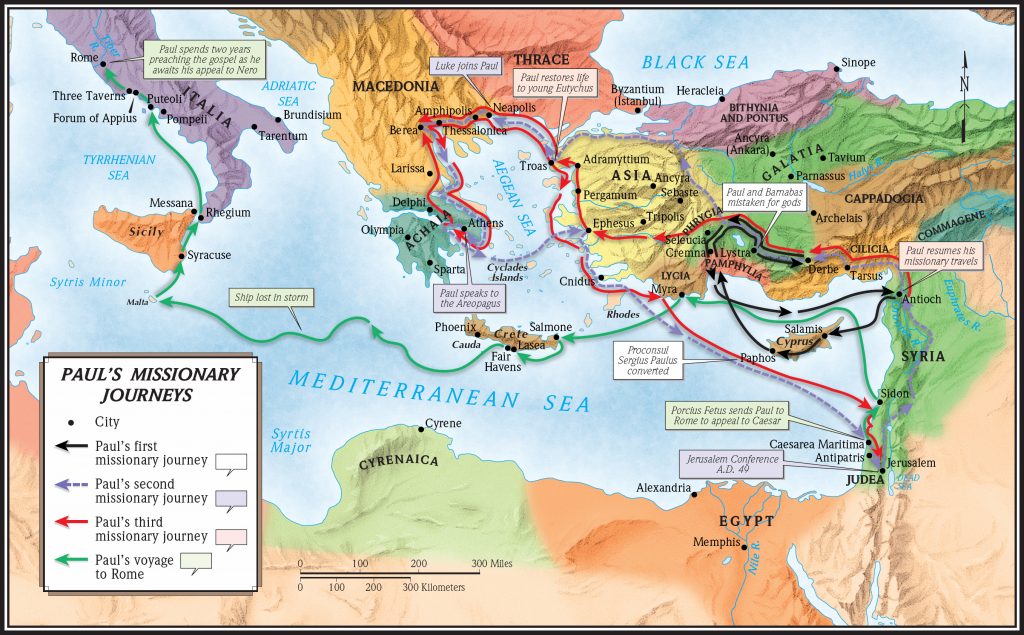This post aims to offer detailed thoughts about various perspectives concerning ministry types that operate among churches. Some churches will have these functions, while others will have a limited subset not covered here. Over several weeks, I have viewed numerous interviews and read through various texts and articles about ministry as an outpouring of effort in obedience to God’s compassion and love for people to bring about spiritual renewal and reconciliation to Him. First, this paper gets an up-close look at a personal philosophy of ministry derived from a compilation of ministry types. The common thread among them is the biblical standard to which they exist and operate.
Philosophy of Ministry
Ministry types covered here include preaching, worship, counseling, missions, and various others to get a firm grip on a cross-section of ministries common among churches. None of these carry more weight and importance as compared to others. However, some are subordinate in terms of authority and function.
Preaching
Exegetical preaching is working from the Word of God to convey His message to people. As God is the author of the Word, the Holy Spirit and Christ speak to the church through His Word. Whether positive or negative, preaching the Word involves rightly dividing Scripture. Where every piece or passage is cut straight or interpreted correctly, it’s to feed the flock of God from the Word of God. Topical preaching by exposition involves using various Scripture texts that converge on a subject. Comparatively, charismatic or mystical preaching can be subjective and impulse-based. Sentimental preaching is between charismatic and exegetical preaching as it appeals to emotion where sinners are made to feel good about themselves. It attempts to bridge the offense of biblical preaching concerning sin, humanity’s condition, and God’s justice.
The purpose of informing people of the entire counsel of God includes pointing out sin among people. The point of telling people about sin is to direct them to God for mercy, grace, and renewal. People will be offended, but the preacher must attend to the truth out of love for a person’s soul. It is an act of integrity, and to not preach the truth is a betrayal of the conviction about that truth. The preacher is speaking for an audience of one as God is honored. The text of Scripture is made clear during the course of preaching. As the conscience either excuses or accuses, it is the preacher’s responsibility to herald the truth as the correctly interpreted meaning of Scripture brings out a response or action from it.
Every sermon is a monologue as an argument or effort to convince a listener about what is true. The preacher uses the Scripture because it possesses authority beyond himself. The preacher’s method of discourse is to hold the argument to a conclusion consistent with the intended meaning of Scripture. This would involve the logical flow, original language, and other passages reinforcing the message. The path to persuasion through argumentation isn’t sentimental, but it’s to convince a listener of what is necessary to conclude. Teaching is to inform, and preaching is to proclaim.
The preacher speaks to the most biblically astute without being too profound or simplistic. Settling a message to the lowest common denominator of learners accedes to the people who do not love the Word the most. Preaching to the more astute learners pulls up the congregation, where the rest in attendance are informed about where they need to be. It is necessary to backfill what resources are necessary for the discipleship of people who hunger for God and His Word just as well. It is necessary to hold a high standard as people are spiritually developed within the church. Set expectations within the church to feed the continuous hunger among people where everyone is pulled up to a growing or increasing development in their walk with Christ. It follows that the congregation’s richness in worship derives from the theology they’ve learned.
Flexibility around responsibilities is necessary as it is on a path toward spiritual growth. As there is an emphasis on delivering messages from the leader’s or preacher’s gifts, there is a pressing need to train people toward leadership. Where men, women, and volunteers are developed to serve in ministry as necessary. As a pastor, there are two areas of focus and prevalent concern. First to the duties of preaching, and second to the teaching responsibility. The other responsibilities that follow are secondary and tertiary.
The life of the church is to exalt the Lord Jesus Christ. The purpose of the pastor is to feed the sheep. Feeding the flock of God is accomplished through the implanting of the Word. The primary purpose of the church isn’t to evangelize or entertain. Congregants of the church gather together to feed on the Word of God and, in response, worship Him. The goal of the church is Godward. God is the audience as worship in prayer, singing, service, listening, giving, obeying, and loving are fruits of people spiritually regenerated and filled to abide in Him. So, putting God on display is through His Word with theological truths and principles necessary for worship in spirit and truth as an immediate interest within the church.
The church’s ultimate purpose is to go out and live Godly, Christ-exalting, biblically clear lives in the world for evangelistic purposes. An untransformed and entertained group of people who attend church will not make the gospel believable. People have to be transformed. The church gathers to be edified, worship, and then scatters to evangelize. Shepherds don’t have sheep. Sheep have sheep. Shepherds shepherd the sheep, and the sheep reproduce.
Structurally, God delivered his revelation in 66-books. Sequential teaching from beginning to end is the method a preacher generally follows. In preparation, the preacher has read the passage numerous times to get the content in-depth. Further efforts are applied to the background and cultural issues about the passage to go through the book. The effort isn’t to wing it or pick passages at random and speak to them. The effort is thematic and contextual while consulting commentaries during preparation before delivery of a message to a congregation. Doctrinal truths reinforced by cross-references are an integral part of message preparation and delivery. Notes from research and study are then compiled into message delivery from the pulpit while the preacher is spiritually affected by the meaning of truth passages.
As there are many ways to translate a verse, it is better to avoid using other translated words to get at biblical meaning. Going back to the words of Scripture from original root manuscripts provides better meaning within the original context of the biblical writers. Authorial use of original words across Scripture is informative to get further precision about meaning as bible translations are updated to get scripture into the vernacular. Bringing the Bible into a post-modern worldview can introduce errors as it is necessary to place people into the times of Scripture. What a verse a passage meant when it was written is what it means now. Changing the words from translations dilutes meaning, so returning to original languages helps. Relying upon older commentators who are adept at original languages further reinforces intended understanding.
The Old Testament is divine revelation and a book of examples that illustrates God’s attitudes about righteousness and sin. The whole redemptive old covenant story foreshadows the mysteries of the new covenant. The whole counsel of God includes both the Old and New Testaments. So, it’s necessary to draw from the Old Testament to get to the significance and meaning of the New Testament. The New Testament reveals Old Testament mysteries and truths now fulfilled and made evident and preaching and teaching from such a perspective is necessary. Platitudes of Christian living without the appropriate contexts between Old and New Testament revelation are unhelpful.
Clarity of the message is a primary concern. The pastor needs to understand Scripture very well to speak on it and clearly deliver its meaning. If a pastor is not clear to congregants, that probably means the message or communication is not clear to the pastor. Preaching from the intensity of the heart as truth and meaning has a stronger grip on the pastor. A message and its preparation must be poured through the pastor’s soul. An abbreviated, automated, or outsourced approach is not acceptable, and slowing down the sermon preparation process to internalize everything is necessary. By the time the pastor gets to the pulpit, it has to be a message that has to be unloaded. The message has to capture the heart, and it has to take time.
Reading theology, biographies, and monographs serve as models or examples of spiritual development that translates to congregations. By comparison, culture or social-based messages do not offer the substance necessary for the spiritual growth of groups or individuals. Joel R. Beeke, who wrote Reformed Preaching: Proclaiming God’s Word from the Heart of the Preacher to the Heart of His People, is recommended reading as it concerns historical perspectives from prominent preachers (Crossway, 2018, ISBN: 978-1-4335-5927-3).
Preachers must be explicit on sin issues and seek unity, but unity in truth. Truth does not give way to unity. This way, preaching must be bold and loving, and repetition is necessary for retention. Preaching biblical truth is essential but must be varied and fresh to prevent familiarity from breeding contempt. Friendships and congregants who hold high expectations of pastors as preachers are necessary. Preachers let the Bible do its work, and while understanding the church is a long process, it is imperative to be very loving and patient. Pastors must try to ram through changes. Change is a life-long process; much more is accomplished if God’s Word is taught lovingly and faithfully while loving people through the process of change. So, do not make demands and do not force change. Just show people the Word of God, love them as they are, and in the process, change will come. Remain biblical in all that is done as a pastor. Become saturated with Scripture and know what Christ expects, the church, and the ministry. Be faithful to the work given.
Worship
What a person does in corporate worship is a continuation of what happens during private worship. Church worship time is compressed during worship service; if Scripture reading is abbreviated during service, it will be abbreviated in private life. Corporate worship is a model for congregants about what personal worship should be. Regardless of personal mood or someone’s attitude at the time, worship is essential because of who God is and what He does. Considering the magnificence of creation, God is more than worthy of worship at any time and under any circumstances.
Hebrews 10:19 presents to believers the reality and severity of God’s holiness. Yet, with the believer, there is confidence in Christ to approach Him in worship. To approach God requires preparation because of His holiness and where He is. Therefore, daily confession, repentance, or purging of sin is necessary before God in preparation for worship. It is in the individual worshiper’s interest to offer God a pure heart as He is approached. People are to present themselves in worship toward Him with a proper heart attitude (John 4:23-24).
Personal confession is fundamentally essential to prepare before worship. As some high churches are cold and sterile, there is still respect for who God is. And it can be extra challenging to worship in a setting that is not conducive to an environment of silence or reverence. So it is essential to remain in prayer and speak with God while before Him in worship while enduring an unfamiliar or difficult situation. There is no compartmentalization in worship, and worship is a 168-hour-a-week vocation. It is continuous in all facets of life, about who you believe God is and how you worship Him. The priority is God, and the worship offered is directed toward Him and not only what He has done for the worshiper. As it is suggested that worship is boasting in God, according to the Westminster Confession of Faith, “the chief end of man is to glorify God and enjoy Him forever.”
As the Psalms clearly indicate, God is the direction of personal worship (Ps. 145:1, Ps. 45:11, Ps. 99:5). Everything we see in culture, to the contrary, leads to self-worship. Self-adulation is all about “me” to indicate an incorrect direction of worship. Worship is not for self-amusement or entertainment in its cultural format (marketing, commercials, news, media, etc.) and cannot represent our worship experience. God is the only audience in our worship. He is the focus of the worshiper. Worship is what you give to the effort. Not what you are receiving or getting out of it. As echoed by Jesus, “Peter, do you love me?”, “Peter, do you love me?”, “Peter, do you love me?” God’s people are to love Him with their whole hearts. It’s not enough to merely like Him. Worship is an attitude of the heart.
How God’s people prepare for worship correlates to their attitude toward God. If a person is of a pure and willing heart, prepared to worship in spirit and truth, worship is acceptable to God by grace as a person presents him or herself as they are. Before God in praise, singing, presence, prayer, or benediction, insofar as it is up to the worshiper, let him or herself appear in attire better than loose casual wear. The worshiper’s opportunity to present cleanliness as they appear before God is a time of honor and fresh appearance. Washing up and dressing nicely is an expression of preparation. A good night’s sleep and rest before worship, along with eating for energy, adds to the longevity and vitality of worship with time before God.
As the pastor is the worship leader, the music pastor or director assures that worship is theologically correct and biblically rooted during song, prayer, and material reading. Worshipers wash their hearts through the reading of God’s word. While reading out loud, music is to assist in prayer and Scripture reading. Theologically correct music, whether as hymns or contemporary expressions, sets the mood with the occasion. Worship music is music that demands spiritual attention. As spiritually meaningful worship music is theologically deep with lyrical content, it supports deeper engagement by personal expression. If the text of Scripture, doctrine, or confessional subject matter are essential, they must be married to the mind through melody. Harmony makes the message and melody stronger. Rhythm is what ties everything together as music.
In church, the most important piece of worship music is the lyrics. Music is what makes the lyrics stronger. Music is the servant of our faith. The rule is that in corporate worship, the lyrics are most important, and the lyrical value is reduced if the harmony, melody, rhythm, or method of performance becomes most prominent. From the lyrics’ primary use and purpose, the music’s theology supports what is preached and taught. Admonishing, encouraging, and warning are throughout Scripture. The Psalm is exciting because of its meaning and range of substance in worship. The psalter tells us why we worship. It is an offering, and it is a communion and prayer. It’s a reiteration of Scripture.
Counseling
The notion that biblical counseling is a type of discipleship was a different way of looking at the practice. Compared to the conventional way of living out a person’s life as a disciple of Christ, believers are expected to do what Christ instructed by how He defined discipleship in Scripture. Biblical counseling within a church is a ministry, but the character development and correction that happens through ministering the Bible to people with real problems can have therapeutic value. Helping people who want counseling by getting into their lives involves specific one-to-one interest that requires a detailed understanding of a person and the issues faced. Targeted discipleship includes biblical counseling.
To further understand the meaning of biblical counseling, it would be helpful to understand how it is characterized with a description of the practice and distinctions about what it does compared to secular counseling. Interpersonal counsel occurs between people with regularity as an informal type of ministry or discipleship. Still, the formal practice of biblical counseling should have a purpose where further levels of care by qualified counselors can offer more meaningful help to those with more deeply rooted issues. There are various clinical methods of help, but biblical counselors within the church are better supported among the leadership as God’s people. And how Scripture ministers to people at a more personal level does not include dispensing biblical truth through its use by counsel that instead involves more careful attention unique to individual circumstances.
While problem resolution at individual granularity is unpleasant, it’s a vital function of church shepherds who helps people who undergo hardships. Counselors minister to people not as a professional pursuit but as a ministry that reaches people to help solve problems that cause them to seek lasting change. Educated and qualified people who serve as counselors support churches as they minister to people. Still, vetting individuals for soul work should involve more than a standard background check among leaders. There are widespread abuse claims against leaders among churches that generally happen through counseling sessions that take advantage of the vulnerable. Counseling that occurs among elders and congregation members must involve much more than trust, but a high degree of certainty that there could not be undue social repercussions or stigma that follows without consequences to counselors. Confidentiality is of utmost importance as morally, ethically, and legally permitted.
Both public and private proclamation of God’s word is supported through Scripture, as explained by Acts 20:20. Meeting with people privately is a more direct and intimate way of getting at impediments to sanctification as believers mature in Christ. Compared to a public proclamation in the church where exhortations and corrective measures are not specific to a person, pastoral and elder messages are informative and potentially result in heart change among congregants. Individual and private sessions are more kinetic as they produce work within the believer to effect restoration or perspective among hardships. Pastoral counseling is one-to-one with people, as was Apostle Paul’s work and Christ himself. Shepherds of the church should do likewise. Pastors and elders are not to be isolated from church members and are integral to counseling efforts that occur with regularity involving elders, certified counselors, Stephen ministers, and the like. Biblical counseling takes persistence with people, and insights into the human heart, including a deeper understanding of Scripture. Bringing both together for the work of ministry as a biblical counselor is an integral and Scriptural approach to discipleship that honors God.
Administration
The growth of a church involves the development of a scalable body of believers within an organization structured around people, processes, and systems. It consists of managers and directors who focus on the church as an organization to achieve its objectives coherently. Foundational are the competencies of individuals who fit the organization by requirements defined by a job description involving duties, roles, and responsibilities. Its practices conform to the church’s goals, and its objectives match its leaders’ capabilities to assure performance in accordance with its mission and vision. While the focus of the church organization is coherent with its people, processes, and systems, there is a corresponding recognition that resources are necessary to suit its continued interests. Namely, staffing, budgets, capital, legal support, payroll, human resources, insurance, inventory, administration, and revenues such as fundraising, donations, and giving to function where growth is supported or scaled to desired attendance.
Pastors and church leaders answer questions about the background and operating characteristics of the church organization. The recruitment and selection process of staff members within the church organization involves spiritual gifts, skills, and talents among qualified people who satisfy eligibility requirements and maximize the likelihood of meeting the organization’s objectives through performance. Pastors and leaders who manage volunteers are responsible for the frontline delivery of ministry functions that satisfy congregants toward their continued spiritual formation and well-being for growth and retention.
People who donate time, energy, and skills are situated among church attendees who seek fellowship, biblical instruction, and growth in sanctification. Whether as musicians, nursery volunteers, parking attendants, and media techs, labor is donated by volunteers who help people within a managed framework of attaining an ongoing return on effort. Volunteers serve God through the church and the community toward organizations and individuals regardless of locale or status. The conduit of spiritual development is often solely through small groups with leadership-prescribed social interests that yield specific topical benefits, aside from pulpit messages that occur each week. Without careful attention, formal discipleship in biblical form rarely propagates through structured means under such a conduit. Discipleship and volunteer work through small groups are not mutually exclusive.
While carefully listening to the details about a church fraught with unreachable expectations, organizational warning signs, divergent personal aspirations, and off-mission objectives, that church will be strained to make a meaningful contribution or difference in people’s lives. The heaviness or burden of circumstances through undue hardship can appear disheartening and worrisome as pastors and leaders are expected to become insular at some level to “win.” If the church is occupied by functional managers first with pragmatic expectations at every turn, then that is a church that will have limited spiritual reach. Such conditions set an environment of one-upmanship. The church isn’t a veneer of a corporate organization with a business model that serves a community of people to gather in a safe social place with a distant focus on the biblical mandate of spiritual growth, instruction, and what God intended for His church.
The size of the church and the risk of knowing people with needs isn’t a cloak to keep pastors and leaders from common church congregants. If not everyone, at least some, to get a deeper and broader understanding of people’s hearts beyond what they’re informed about from staff and volunteers.
Conflict
The ministry of peacemaking is a desperate area of ministry abundantly needed within the church. While making peace is one thing, achieving reconciliation through peacemaking is different. Relationally, people in opposition to one another become separated by differing views and interests that conflict and could involve resolution or escalation as disputes or animosity remain present and affect others. As believers are people of faith and obedience, it is often of mutual interest to mediate impasses that adversely affect the spiritual health of those involved. People offended or harmed by others who withdraw or hold resentments can become burdened with resentments that bear out as unforgiving in contradiction to biblical exhortations given by Jesus and apostle Paul, “forgiving each other; as the Lord has forgiven you, so you also must forgive” (Matt 6:15, Luke 6:37, Col 3:13, Eph 4:32).
While under relational distress or hardships, believers do not always live out what they say they believe. That produces incongruent thinking that is impossible to reconcile with the word of God. And that, in turn, produces anxiety in the believer who would rather avoid such circumstances. The peacemaker’s role is thus to facilitate restoring relationships among people and with people in their relationship with God to let go of unforgiveness, bitterness, or resentment. Through confession, humility, and repentance, the change of heart occurs more congruent within a biblically guided framework. Ephesians 4 and various additional passages of Scripture offer beneficial aids to get through interpersonal difficulties. Numerous theological and doctrinal concerns immediately affect how and why reconciliation occurs.
Conflict resolution involves deeper disputes involving mediation. Apparently, as an advanced form of biblical counseling, conflict resolution spans a range of difficulties that could involve intense emotions or eventual legal claims counseled against Scripture. For reasons concerning escalation, retaliation, or further damages (emotional or otherwise), mediators would likely have to secure waivers against liability in the unforeseen event that may become a broader problem. In this regard, liability insurance and certifications that protect biblical mediators and their associated ministry are an assumed necessity. Biblical mediation is to reconcile people for restorative purposes without lingering animosity since forgiveness is expected through the process.
The method by which conflict resolution happens is through a careful mediation process that is guided by a period of one-to-one party counseling where biblical and theological principles are discussed to facilitate humble perspectives, confession, and a willingness to forgive. A process that could involve the absorption of pain by one or both individuals (or parties) may involve emotional distress inflicted on a counselor. Still, as God has permitted His name to be disparaged among unbelievers or believers for redemptive and sanctification purposes, the risk of encountering verbal hardship is what it is to be a peacemaker. During the reconciliation process, where biblical principles are learned with emotional and interpersonal pain absorbed, sessions that resolve disputes serve as a life experience with a significant spiritual value that carries over to other areas of problems that could otherwise surface. In this way, the character and interpersonal development that takes place is regarded as a form of discipleship as it becomes clear what it is to understand mercy, grace, and forgiveness with a willingness to live by it.
People who are called to a conflict resolution ministry are those who are willing to be Christlike. Peacemakers are those who can minister the word of God. They are gentle and meek and are not abrasive. They have a calming demeanor with a deep conviction for truthfulness and peace. These are people of love to resolve issues for the compelling beauty of reconciliation. They are foot washers in the ultimate sense as they wipe away unwanted mud, dirt, and stains that negatively affect the testimony of the gospel among believers. As mediators get to the heart of disputes and help people understand false beliefs about fears and the felt needs for security and significance, they offer biblical clarity about where true peace, rest, belonging, and value are in our relationship with God and each other through Christ Jesus.
Outreach
As the topic of outreach and missions is more fully considered, various factors can be considered as an approach to the gospel and the great commission. Evangelism and mission are framed as a lifestyle integral to the kingdom worldview attributed to every Christian. Whether locally in a personal or professional context or from more elaborate and well-developed geographical involvement, the practice of developing relationships spans across cultures, languages, and time zones. More narrowly, to “love your neighbor,” the formation of relationships bears the fruit of friendships and an eventual sharing of who we are as believers through the good news of Christ. Our transformed lives in Christ become integral to who we are as people fully invested in others. Contrary to a programmatic approach to outreach, missions, and the gospel, there is an embodiment of continued and persistent interest in others to reach people toward reconciliation and fulfillment in Christ.
A template or spray-and-pray approach to evangelism and outreach is largely ineffective. As unbelieving people take notice of their sincere and meaningful relationships with believers and the differences in their beliefs, confidence, and perspectives, there is a deeper and more personal impact of the gospel and the offer of reconciliation, security, and purpose. There is a place for evangelism through various means that don’t involve direct personal relationships, but the outreach of that approach, by definition, is limited. Outreach and missions per se are longer-term endeavors that require the fully Christ-saturated person to walk the gospel and speak its meaning into the lives of people who need it. The person who lives the gospel for continued purposes of outreach derives their identity around what it is to be an ambassador of Christ (2 Cor 5:20).
There is an intentionality to the practice of outreach as a lifestyle. There is a prevalent mindset about it when interacting with people. Through authentic friendships, there is a mutual sharing of interests and values, where there is no place for a bait-and-switch way of living out faith among people we love. The preparatory efforts in relationship building as an integral approach to outreach are necessary without strings attached or a fear of losing a friendship over disagreements or rejection of the gospel. During relationship development, when people need support and friendship, it is of utmost value to be a friend to confide in and hear how believers cope and place their faith and hope in Christ.
While thinking through the interactions among unbelieving friends, coworkers, and acquaintances, there is an expected and intentional perspective a believer in Christ should have about their standing before God. More than what is valued about them and how productive our relationships are, a necessary focus is needed to develop better quality and deeper relationships that last. Living the better version of oneself in what is said and done among others within an authentic context of friendship situates friends in a position of mutual compatibility as conversations happen favorable to the purposes of an unbeliever’s interest in the gospel. Not out of overt persuasion as if a person is a project, but to share the heart about matters of life pertinent to the relationship. The overflow of any relationship with Christ Jesus that makes an impression is worth building upon toward an authentic love and interest that the unbelieving friend perceives.
An introverted and analytical person is not usually inclined to be immersed in the lives of a range of people, so it is necessary to be receptive to what God would want about how people become involved with one another. With the intentional perspective of forming relationships for the central purpose of outreach and spiritual reconciliation through the gospel.
Missions
The recruitment, vetting, and equipping processes of mission functions within the church involve mission workers’ successful placement and effectiveness. The coordination and management of numerous individuals, agencies, and local churches that together provide a conduit of ministry is an orchestrated endeavor with many moving parts. How mission workers are placed into the field for ongoing kingdom work is very involved, and the administration and management of individuals or teams in the field involve careful attention to detail. Close interaction with people vested in the physical and spiritual well-being of mission workers requires a long-term commitment, whether mission work is long-term or short-term, across various individuals or teams. The heart of a sending church is not only concerned with the missions in which they serve but also with the people who serve in such a capacity. There is an underlying assumption that the Lord is at work with the people prepared and appointed for the sacred work of the mission field. And the total outreach effort of the sending church between local areas or abroad is not mutually exclusive but a matter of sorting through available resources and priorities. The mandate to take the gospel and discipleship to the world is clear. Choices surrounding mission initiatives are not exclusionary in this regard.
Outreach among local communities and regions further afield includes short-term and long-term mission endeavors, including occupational insertion of people within community groups, work, or social settings. This effort may or may not involve a church planting effort based upon the spiritual need, interests, and or criteria of the sending church and supporting agencies. With church planting initiatives with long-term outcomes and results, the prospect of discipleship and spiritual formation becomes a scalable outreach proposition as others in the field can multiply for added longevity—the logistics and support needs of mission partners in the field are a function of objectives, location, and duration of stay.
For field workers involved in outreach as long-term missions and church planting, there are various means by which support is lined up and sustained. Clear lines of support and authority, well-connected communication, field resources, home facilities, transportation, close family-church inclusion, and periods of rest are all integral to well-developed missions programs from churches that sponsor and charter outreach for lasting impact. To optimize mission work, there are suggested areas of concern about the selection, equipping, and preparation of would-be missionaries. The people skills, biblical literacy, and flexibility of people who prepare and become deployed are necessities for mission objectives and success.
Interpersonal capabilities to form and maintain relationships and resolve disputes are the first of all skills necessary. While mission workers can have a reputation for not working well with one another in the field, short-term missions to develop interpersonal capabilities are an indispensable value toward long-term missions to avoid undue loss of time, money, and resources. The second point of interest includes a lack of biblical depth concerning faith and practice. Principles of discipleship, doctrinal beliefs, and defense of the faith across cultural settings are necessary for a rooted means toward biblical convictions, spiritual formation, discipline, and practice. Finally, it is necessary to develop and maintain a posture of flexibility regarding placement and field objectives during selection, preparation, and deployment. Mission worker candidates must demonstrate commitment, background, preparation, and flexibility in processes, methods, and interdependent relationships among people.
Renewal and Longevity
It is a grace and mercy that people who return to Christ Jesus as the vine (John 15:5) and the source of living water remain with Him. God, through His word, is an unending source of nourishment as His people are trees planted by streams of living water. Renewal by Christ Jesus through His Word produces fruits of the Spirit as believers again drink from streams of life to attain spiritual health and peace. More specifically, cultivating joy that renders deep faith and practice is necessary for continued nourishment, spiritual peace, and mental well-being. As necessary for challenges in life, that joy as a fruit of the trees comes from the inhabited Spirit who is a conduit for others blessed and comforted through their sanctification and sufferings. There are various fruits of the Spirit, as articulated in Galatians 5:22.
Living from the well of life apart from God is to forsake Him (Jer 2:13). Instead of drawing from the spring of living water from God, believers who live by their own will and interests do so from broken cisterns that cannot hold water. Accordingly, setting out on one’s own isn’t sustainable or long-term viable to draw from outside fellowship with God. The fruits of the Spirit spoken as truth are united with His life-giving power from a daily encounter with God. Life-giving nourishment of the Spirit comes from time alone with God through His Word. As Christ Jesus modeled for us, while people were among Him in desperation for teaching, truth, and healing, He withdrew from them to draw close to Father God in prayer (Luke 5:15-16). His time with God was a crucial source of intimacy even with the pressures of ministry among people who wanted to hear Him and be healed of their infirmities.
The two threats that have the potential to separate believers from the intimate connection with God are distraction and self-dependence. In alignment with Matthew 13, Jesus spoke of the parable of the Sower to make clear what chokes out, inhibits, or removes the Word from a person’s life. Valuing the wrong things over Christ Jesus and His Word takes our focus, priority, and intentionality elsewhere. As given by the example in Luke 10:38-42 with Mary and Martha, Jesus spoke of the necessity of choosing the good portion of fellowship with Him and intimacy with God over the busyness of daily necessities. Mary chose not to forfeit the most essential thing with Jesus as compared to Martha attending their gathering with the well-intentioned nobility of hospitality. A believer’s proper perspective about personal identity in Christ is best understood as the branch and vine analogy that He spoke about (John 15:5).
The warning signs about a believer disconnected from the vine include one or more of the following:
- Absence of fruit of Spirit
- Lack of margin, patience, humility, and charity
- Presence of pride, self-interest, defensiveness
- Fleshly interests and carnality, or appetites too fleshly
- Emotional fatigue and tense attitude of the heart from the grind of work
While circumstances and incident-driven occurrences give temporary rise to these conditions, they cannot be permitted to remain in place. The overwhelming pattern in the life of a believer must be personal time alone in prayer, in God’s Word (the Holy Bible), and worship. In truth and purity, believers shall abide in Christ to regain and sustain the spiritual nourishment essential to walk in the Spirit. Remaining in despair, discouragement, and distress indicates that a believer is disconnected from the vine or drinking from a broken cistern. A pattern and practice of these categories is the absence of margin and joy in a believer’s life.
While doing work unto the Lord, it is with the engine and furnace of the Spirit of God within. Passion, focus, and joy contribute to attitude as a source of fruitful energy that comes from time with God alone. Sin breaks fellowship. Willfulness can break fellowship. Self-interest (sin) breaks fellowship, so there is a need to be in daily immersion in God’s Word. Without the continuous renewal of the Spirit, burnout and fatigue can begin to take hold. Some evident attitudes that point to the onset of burnout include the following:
- You think you can fix everyone’s problems
- You have to fix everything right now
- You are responsible for everything that goes on in the church
- You can control everything in the church
- You have the answers to everything
- You can never show any weakness and need for growth
These attitudes are contradictory to truth statements of Scripture. To remain in proper perspective, intake of the whole counsel of God grows through time alone with Him. Absorption of God’s Word is an intentional, persistent, and conscious effort that requires reserved time (scheduled time) with God first at the beginning of each day, as He matters most. Priorities drive schedule, and emphatic yeses set priorities with non-negotiable noes. So, if priorities are not on your schedule, they’re not as important. The danger of the best is not the bad, it is the good.
Preparation to serve God’s people begins with inner joy and spiritual nourishment. This position of spiritual health derives from a consistent daily time in the Word and prayer while remaining in truth and purity. Believers will be held accountable for their spouses and the spiritual well-being of their families. Most immediate relationships among others before God is what matters most over all other endeavors. The source of life to support a family’s spiritual well-being comes from meditation on God’s Word. Ongoing intentional interaction with God’s Word is necessary to experience an inner life of peace and joy from the spring of living water. So, as a matter of process, some suggested methods of Scripture immersion include the following:
- Before sleep, meditate on a Psalm or passage of interest for five minutes to set God’s Word as the last thing on your conscious mind.
- In the morning, attempt to memorize a corresponding verse while in the restroom and preparing for the day. Have a verse pack on the go in the bathroom at the sink and shower.
- Once ready for the day, evaluate mediated Word in an expanded way through devotion to evaluate meaning and implication further.
- Pray the passage of interest at lunch – a cadence of attention to his Word is characterized by a time of personalization throughout the day.
- Draw or visualize compelling imagery about the time of contemplation to work out the truth of the verse or passage.
- Share the experience in the Word with family, friends, and others. Talk it out to learn it.
- Apply it – Not just to know it, but to do it.
Accountability and close personal relationships to encourage and exhort believers are necessary to assure personal alone time with God. However, close and careful attention must be paid to who a believer confides in (Prov 20:6) about passages meditated upon as a matter of reflection and application. Long-term relationships are often betrayed by unfaithful men or women who abandon confidentiality and cause undue harm for intentional or unintentional reasons. If someone reveals to a believer another person’s private life, renewal, and reflection experiences in the Word of God, it can be assured that the person is doing the same with others. Whether in an immediate context or later, the believer must know who is reliable to trust.
Leadership Qualifications
The biblical qualifications for spiritual leadership within the church are extensive, involving various character attributes suitable for people who serve and worship God in a holy congregation. When apostle Paul wrote to Timothy concerning the qualifications of elders within the church, he did so with explicit detail that leaves no question about eligibility requirements. Consistent with biblical writers elsewhere, Paul reinforces the required standards by which leaders serve with baseline character traits suitable and appropriate for the care of people in the first-century church as well as today. These traits complement one another to serve as a model and example of conduct for those in the church. Leadership that attempts to perform its shepherding duties with flaws in character in any of these areas presents problems to the church that ultimately affect congregants.
A leader with a reputation, social status, charisma, and wealth who has impeccable qualifications for leadership in a secular context doesn’t render that person suitable for leadership in the church. Godly character over functional capabilities prevails as qualifying attributes as described in 1 Timothy 3. Each specific qualifying attribute parsed and defined serves as an individually identified requirement with explicit meaning. These attributes, separately or combined, are not guidelines to loosely follow but specify what requirements must be met to serve as an elder or pastor of a church. These requirements are not optional or subject to cultural conditions within secular society that have a bearing on governance and commerce or impose contradictory regulatory requirements. God’s Word through the Apostle Paul has the greatest authority.
This table closely corresponds to Paul’s epistle to Timothy with explanatory descriptions of the root meaning of the biblical text. No consideration was given to church denominations that hold to contradictory traditions or social considerations involving cultural pressures.
| Qualifications | Definitions and Descriptions | References |
|---|---|---|
| Blameless | Above reproach and not deserving or worthy of rebuke or criticism | 1 Tim 3:2, 1 Tim 5:7 |
| Husband of One Wife | Male, married only once, monogamous, and moral. | 1 Tim 5:9-15 |
| Temperate | Not given to excess or extremes in behavior | 1 Tim 3:2,11, Titus 2:2 |
| Sober-Minded | Self-disciplined and wisely keeping self-control over passions and desires | 1 Tim 3:2, Titus 1:8, Titus 2:2,5 |
| Good Behavior | Organized with admirable propriety and moderation | 1 Tim 2:9, 1 Tim 3:2 |
| Hospitable | Disposed to treat guests and strangers with cordiality and generosity | 1 Tim 3:2, Titus 1:8, 1 Pet 4:9 |
| Able or Apt to Teach | Ability to impart skills or knowledge to people and do it well | 1 Tim 3:2, 2 Tim 2:24 |
| Not a Drunkard | Not a drunkard who is especially predisposed to wine beverages | 1 Tim 3:3, Titus 1:7 |
| Not Violent but Gentle | Not a fighter, bully, or a cruel, violent, and brutal person | 1 Tim 3:3, Titus 1:7 |
| Patient | Lenient and easily pardons human failure – merciful or tolerant of slight deviations from moral or legal rectitude | 1 Tim 3:3, Titus 3:2, Jas 3:17, 1 Pet 2:18 |
| Not A Brawler | Not quarrelsome – Inclined and disposed to peace | 1 Tim 3:3, Titus 3:2 |
| Not Greedy (aischrokerdēs) | Not fond of dishonest gain – being so desirous of acquiring wealth that it brings disgrace and shame on a person | 1 Tim 3:3,8, Titus 1:7 |
| Not Covetous (aphilargyros) | Not a lover of money – not characterized by an immoderate desire to acquire wealth | 1 Tim 3:3, Heb 13:5 |
| Manages Household of Children Well | Manages a Godly family household in an exemplary manner | 1 Tim 3:4-5, 1 Thess 5:12 |
| Not a Recent Convert | A mature believer in Christ | 1 Tim 3:6 |
| Well Thought of By Outsiders | A confirmed testimony and witness of a person’s good character within the community | 1 Tim 3:7 |
The spiritual capacity of leadership is largely contingent upon its reputation, training, and maturity to satisfy biblical requirements and its character obligations. People who obtain a calling of leadership are not to enter ministry lightly. It is a sacred responsibility to shepherd the people of God as caretakers of their faith and practice. While today, pastors and elders often carry out their responsibilities at a distance from the flock, they too often function with partial eligibility among closer relationships within smaller concentric circles of influence and accountability. Elders or bishops and deacons that see to the affairs of the church aside from pastoral work maintain their duties in ministry according to what they are gifted to perform and accomplish. Their reach within the church should encompass the entire flock as shepherds who oversee congregants and never permit the loss of even a single sheep. Each person’s sanctification is precious before God, and the shepherd’s responsibility is to care for His flock to the last person.
Conclusion
The call to ministry is a sacred privilege and a responsibility of enormous gravity. It is a manner in which gifted believers in Christ serve the church and people of various geographies to love and support communities to advance the Kingdom of God. The various areas in which ministry is carried out are numerous. Formal ministry through the local church or informal ministry of individuals among family, friends, and neighbors must be according to spiritual gifts given by God for His church. The work of Creation is to glorify God, and people who serve in ministry participate in what it means to do that. In the numerous forms of ministry, either formal or informal, sanctioned by the local church or not, the ways in which believers express worship, love, and support for people are according to the spiritual and physical needs of others wherever they are.



























